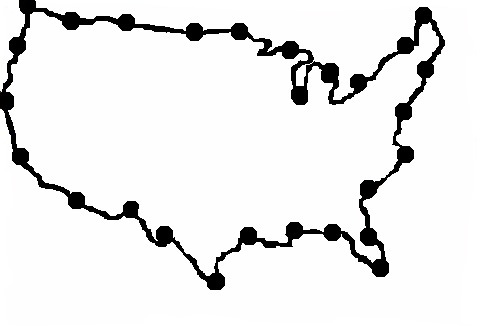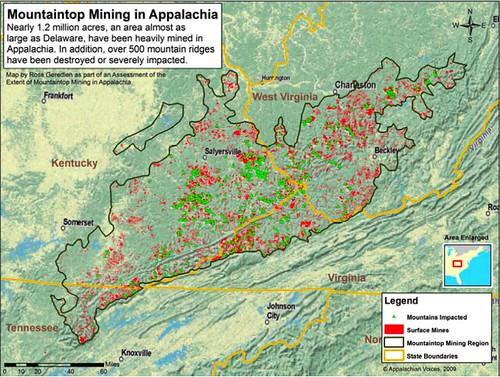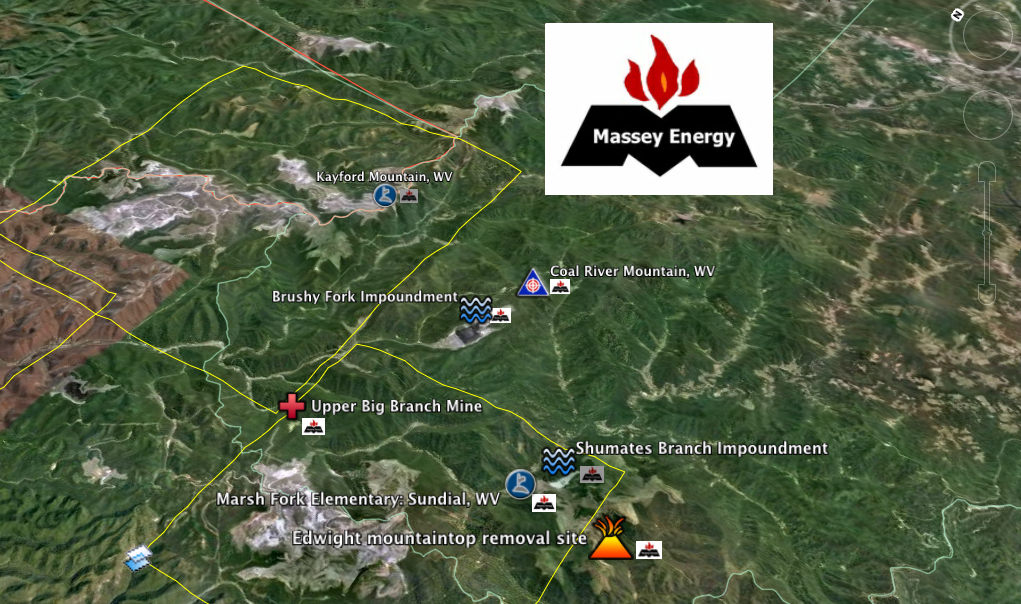“Past error is no excuse for its own perpetuation. Tragedy is a tool for the living to gain wisdom, not a guide by which to live.” – Robert Francis Kennedy
 It’s been over 8 weeks since the deadly explosion at Massey Energy’s Upper Big Branch (UBB) mine claimed the lives of 29 American Miners in Raleigh County, West Virginia. The incident, which was our nation’s deadliest mining accident in 40 years, was unquestionably made more tragic by the fact that it was preventable. In order to ensure that no similar, preventable, coal-related tragedy occurs, it is critically important that we recognize the full breadth of the coal industry’s impact on Appalachian communities and ecology, while collectively accepting shared responsibility for addressing its transgressions. Step one, as they say, is admitting we have a problem.
It’s been over 8 weeks since the deadly explosion at Massey Energy’s Upper Big Branch (UBB) mine claimed the lives of 29 American Miners in Raleigh County, West Virginia. The incident, which was our nation’s deadliest mining accident in 40 years, was unquestionably made more tragic by the fact that it was preventable. In order to ensure that no similar, preventable, coal-related tragedy occurs, it is critically important that we recognize the full breadth of the coal industry’s impact on Appalachian communities and ecology, while collectively accepting shared responsibility for addressing its transgressions. Step one, as they say, is admitting we have a problem.
Upper Big Branch
In the wake of the April 5 explosion, it became increasingly apparent that Massey Energy’s UBB was outrageously mismanaged. The Mine Safety and Health Administration (MSHA) issued the mine over 500 citations in 2009 alone (amounting to $897,325 in proposed penalties) and over 50 citations in March of 2010 alone. MSHA has pointed out that “Massey failed to address these violations over and over again.” Clearly, UBB indicates that something is amiss in the coal industry, but how far does this problem go?
Massey Energy Company
 Let’s take a closer look at Massey Energy, the company (currently being investigated by the FBI) that owns UBB. NYTimes reports that in the past 10 years, there have been 52 deaths at Massey mines. In 2006, a fire at Massey’s Aracoma Alma mine killed two miners, and the company eventually paid $4.2 million in criminal fines and civil penalties. In 2009, Massey was charged with $12.9 million in proposed fines for safety violations. The company appealed 75% of the violations, and awarded its CEO, Don Blankenship, a stunning $2 million safety bonus the same year.
Let’s take a closer look at Massey Energy, the company (currently being investigated by the FBI) that owns UBB. NYTimes reports that in the past 10 years, there have been 52 deaths at Massey mines. In 2006, a fire at Massey’s Aracoma Alma mine killed two miners, and the company eventually paid $4.2 million in criminal fines and civil penalties. In 2009, Massey was charged with $12.9 million in proposed fines for safety violations. The company appealed 75% of the violations, and awarded its CEO, Don Blankenship, a stunning $2 million safety bonus the same year.
In 2003 Massey Energy paid Sylvester, West Virginia residents close to half a million dollars after these residents argued that coal dust from one of the company’s processing plants was impacting their health and property values. In 2004 the company paid $1.54 million to 245 residents of Mingo County, W. Va., after a jury concluded that Massey had acted “with malicious, willful, wanton, reckless or intentional disregard for plaintiffs’ rights,” when it destroyed those residents’ water wells by mining beneath their homes.
In October of 2000, a Massey owned sludge impoundment in Martin County Kentucky failed and leaked more than 300 million gallons of sludge. This sludge killed 1.6 million fish, and contaminated over 27,000 people’s water. The Environmental Protection Agency (EPA) called it the largest environmental catastrophe in the history of the southeastern United States.
In 2008 the EPA fined Massey $20 million for 4,500 violations of the Clean Water Act. This was the largest fine in the history of the law. Then, in 2010 four environmental groups filed a lawsuit against the company citing evidence that, unbelievably, Massey’s Clean Water Act violations had, increased in frequency since its record 2008 fine.
And let there be no mistaking, Massey is also the country’s number one producer of mountaintop removal coal, and as such, bears a large degree of responsibility for the wholesale destruction Appalachian mountains, streams and communities.
Beyond Massey
Massey is a problem for Appalachia that is hard to understate, but sadly coal industry transgressions don’t stop there. After the UBB tragedy, MSHA undertook a five day inspection blitz that targeted 57 mines notorious for safety violations. The blitz resulted in an astounding 1,339 citations. In May, Joseph Main, Assistant Secretary of Labor for Mine Safety and Health remarked, “After last month’s tragic reminder of the consequences of failing to make safety a priority, it is appalling that these operations continued to flout fundamental safety and health standards.”

Things have gotten so bad in Kentucky that earlier this year the Appalachian Center for the Economy and the Environment, Sierra Club, Public Justice, and Kentuckians for the Commonwealth filed a formal petition with the EPA asking the federal agency to take over administration and enforcement of the state’s National Pollution Discharge Elimination System. The group urged this was necessary because of Kentucky’s alleged “capitulation to the coal industry and its complete failure to prevent widespread contamination of state waters by pollution from coal mining operations.”
Any and all coal companies that practice mountaintop removal force Appalachian communities to contend with contaminated drinking water, powerful blasting, airborne dust, and increased flooding (among other things). After coal is extracted from an area, ancient mountains, streams, and valleys that enriched Appalachian communities for generations are reduced to barren wastelands, toxic dumps, and piles of rubble. Mountaintop removal, which occurs in KY, WV, VA and TN, is responsible for the destruction of over 500 of the most biologically diverse mountains on the planet. Around 1.2 millions acres and 2000 miles of vital headwater streams have been destroyed in central and southern Appalachia by the practice. Besides Massey, Alpha Natural Resources, Patriot Coal, Arch Coal, International Coal Group, and Consol Energy produce a heck of a lot of mountaintop removal coal.
Check out some of the press they’ve gotten
“Since April 5, when the Massey-owned Upper Big Branch mine exploded, killing 29 workers inside, Patriot’s 11 underground coal mines in Appalachia have racked up roughly 350 safety violations, according to a review of federal records by TWI. The violations include scores of citations indicating problems with ventilation systems and the accumulation of combustible materials — the very conditions thought to have caused the deadly blast at the UBB project.” – The Washington Independent
“Environmental groups have been fighting the Spruce Mine since 1998, when it was proposed as a 3,113-acre mine that would bury more than 10 miles of streams in the Pigeonroost Hollow area near Blair. Arch Coal had proposed it as a continuation of its Dal-Tex mountaintop removal operation.” – The Charleston Gazette
“Roughly four years after a methane explosion led to the deaths of 12 coal miners at the International Coal Group‘s Sago Mine in Upshur County, not all the regulatory reforms suggested in the wake of the tragedy have been put into effect.” – The State Journal
“Two West Virginia environmental groups say they will sue Consol Energy because of its continuing “harmful pollution” in Dunkard Creek, where a massive fish kill occurred last September.” – Pittsburgh Post-Gazette
Recognizing the Impact
So, apparently coal companies besides Massey are having a negative impact on Appalachia. But how much of an impact?
Well, according to 2009’s Hendryx study, coal mining costs Appalachia $42 billion every year as a result of negative health impacts and loss of life. A 2010 paper published in the journal Science and entitled “Mountaintop Mining Consequences” found that “The scientific evidence of the severe environmental and human impacts from mountaintop removal is strong and irrefutable. Its impacts are pervasive and long lasting and there is no evidence that any mitigation practices successfully reverse the damage it causes.” Considering these findings, is it any wonder that year after year, Gallup-Healthways’ Well-Being Index ranks the states of Kentucky and West Virginia second to last and dead last respectively?
Accepting Responsibility
“Few tragedies can be more extensive than the stunting of life, few injustices deeper than the denial of an opportunity to strive or even to hope, by a limit imposed from without, but falsely identified as lying within.” – Stephen Jay Gould
The fact is Americans across the country contribute to coal industry injustices in Appalachia. Coal-fired power plants from coast to coast either purchase mountaintop removal coal directly, or purchase coal from companies connected to the devastating practice. (Click Here to See if Your Zip Code is Connected)

Leaders of nine large investor groups heavily invested in Massey Energy recently called for the resignation of three Massey directors following the disaster at Upper Big Branch. Who are these investors? The California State Teachers’ Retirement System, the North Carolina Retirement System, the Office of Connecticut State Treasurer, the Illinois State Board of Investment, the Maryland State Pension and Retirement System, the New York State Controller, the New York City Employees’ Retirement System, the Oregon State Treasury, and the Pennsylvania Treasury collectively own 1.4 million shares of Massey Energy valued at over $64 million.
As long as we demand “cheap” fossil fuels, mining companies will continue to have incentives for prioritizing production over worker safety and over the health of Appalachian communities and ecology. It’s easy to think of the problems associated with coal mining as distinctly Appalachian problems, but responsibility for the coal mining industry’s impact extends beyond the region. It extends, beyond Massey, beyond the entire coal industry, and beyond even the agencies that regulate coal mining. Truly, the responsibilty for these problems is shared by all who use electricity in this country.
Moving Forward
We in America owe Appalachia serious investments in just and sustainable jobs. The region has long contributed to the American workforce, and the industrial might of our country has been fueled by the tremendous efforts of the Appalachian people.
Diversification of the area’s economy will give men and women employment opportunities beyond those offered by dangerous, destructive, law evading, companies such as Massey. One way we can immediately take a step in the right direction is by getting our Representatives and Senators behind the Rural Energy Savings Program Act (HR 4785). Click here to learn more.
In order to prevent another coal-related tragedy Appalachian miners need enforced safety regulations, and Appalachian communities and ecologies need an end to mountaintop removal. The region needs these things immediately. Please join us in supporting Congressman Rahall for his efforts to improve miner safety, and in asking Congress to support two bipartisan bills aimed at sharply curtailing mountaintop removal: the Clean Water Protection Act (HR 1310) in the House and the Appalachia Restoration Act (S 696) in the Senate.




Leave a Reply